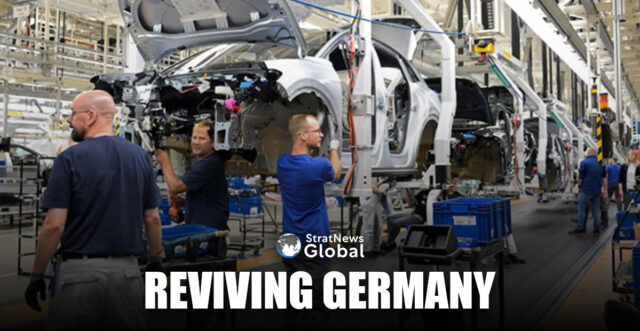The main political parties in Germany will unveil their poll programmes on Tuesday, following parliament’s approval of a no-confidence motion against Chancellor Olaf Scholz‘s government, clearing the path for a snap election on Feb. 23.
Disagreements over how to save Europe’s largest economy had been the main factor behind the collapse of Scholz’s fractious three-party coalition last month, and the economy is the top concern of German voters.
Germany has gone from being Europe’s economic powerhouse to underperforming its major euro zone peers. The economy is expected to contract in 2024 for the second consecutive year.
Here is what is known so far about the parties’ key economic proposals and their stance on a potential reform of the constitutionally enshrined debt brake:
Centre-Left SPD
Scholz’s centre-left Social Democrats (SPD) propose incentivising private investment and modernising infrastructure with an off-budget 100 billion euro ($104.90 billion) fund.
The party also plans to introduce a “Made in Germany” premium to boost investment. The plan includes a direct tax refund of 10% on equipment investments by businesses.
To incentivise purchases of German-made electric cars, the SPD proposes to offer buyers a temporary tax deduction.
Scholz calls for a “moderate reform” of the debt brake – which limits government borrowing to 0.35% of gross domestic product – in order to increase investments in defence, but he has not indicated how he would do that.
Conservative CDU/CSU
The opposition conservatives, an alliance of the Christian Democrats (CDU) and their Bavarian sister party the Christian Social Union (CSU), propose extensive financial relief for companies and citizens, including income and corporate tax cuts, and lower electricity charges. They have not said how these would be financed, a point criticised by other parties.
Conservative leader Friedrich Merz, who according to opinion polls is set to become Germany’s next chancellor, has signalled some openness to a moderate reform of the debt brake but his party’s manifesto has pledged to retain it.
The Greens
Economy Minister Robert Habeck, the Greens’ candidate for chancellor, has called for reform of the debt brake to allow for higher public spending.
The Greens want to invest in capital markets to generate more funds for the statutory pension scheme, creating what they call a “citizens’ fund” with loans and government resources. The fund should take sustainability criteria into account and be aligned with the 1.5 degree Celsius target of the Paris Climate Agreement.
The election programme includes a tax incentive for “small and medium incomes” for the purchase of electric cars, an example of their focus on targeting subsidy programmes towards lower earners. The programme also includes raising the minimum wage to 15 euros per hour in 2025. It is currently 12.41 euros.
Neoliberal FDP
The neoliberal Free Democrats present themselves as the biggest defender of the debt brake. It was the refusal of former Finance Minister Christian Lindner, the FDP leader, to suspend the cap on borrowing that prompted the collapse of Scholz’s coalition.
Although the party programme has not been presented yet, an 18-page policy paper which raised coalition tensions at the start of November gives an idea of the party’s economic lines.
The FDP advocates tax cuts to spur the economy, proposing in the paper an immediate end to a “solidarity” surcharge, paid on top of income and corporation tax and introduced following German reunification to boost the poorer eastern states.
The party also proposed an immediate halt to all new regulations and criticised over-ambitious climate goals.
Far-Right AfD
The far-right Alternative for Germany (AfD), currently in second place after the conservatives according to opinion polls, seeks Germany’s departure from the EU – or “Dexit” – following a referendum like the one that took place in the U.K. in 2016. The party wants the country to ditch the euro and reintroduce the Deutsche Mark. AfD is committed to the debt brake and proposes cutting spending on climate protection and contributions to international institutions.
The other parties have refused to include the anti-immigration AfD in any future coalition government talks.
The AfD has already presented a draft of its own election programme.
(With inputs from Reuters)





